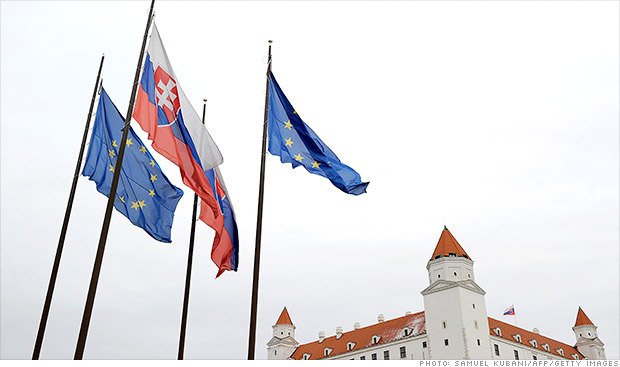
The ECB will meet in the Slovakian capital Bratislava Thursday, under intense pressure to cut rates for the first time since July 2012
LONDON (CNNMoney)
The European Central Bank has kept its main interest rate at a record low of 0.75% since July 2012 but the clamor for it to relax monetary policy is growing as data deteriorates and its peers take more aggressive action to support their economies.
Eurozone inflation fell to 1.7% in March, comfortably below the ECB's target, and economists expect an even weaker print with the release of April numbers Tuesday.
Since the central bank's governing council last met in early April, when the ECB said it was "ready to act" if the gloom deepened, the International Monetary Fund has cut its global forecast and business surveys have signaled renewed weakness in Germany, Europe's most important economy.
Related: U.S. economy revs up but pace may slow
Unemployment levels in struggling eurozone states such as Greece and Spain have scaled new peaks above 27%. Over 6 million Spaniards are now unemployed and more than half of young workers under the age of 24 are out of work in both nations.
Some commentators believe the ECB will hold fire until it releases new forecasts for growth and inflation in June, but a narrow majority of economists surveyed by Reuters expect a cut to 0.50% when the governing council gathers in the Slovakian capital of Bratislava on Thursday.
"Given the latest data, we think that the case for a front-loaded rate cut is strong enough already, so that the ECB is likely to cut rates on May 2," wrote UBS economist Reinhard Cluse in a research note.
European policymakers continue to predict a gradual recovery in output in the second half of the year but are coming under growing pressure to slow the pace of austerity and do more to improve financing conditions for banks and businesses.
Billionaire investor George Soros warned earlier this month that Germany risked sliding into a recession of its own making by insisting on a rigid policy of austerity and because ECB monetary policy was "out of sync" with the quantitative easing being pursued by other major central banks.
Related: Bank of Japan stands firm while deflation worsens
The International Monetary Fund and independent economists have called for the ECB to cut rates, even if the impact may be little more than symbolic because banks in countries such as Italy and Spain are still hobbled by bad debts and need to rebuild their capital.
The ECB is considering other ways of tackling the credit squeeze but has no appetite for the quantitative easing pursued by the Bank of Japan, Federal Reserve or Bank of England.
Its weapon of choice -- buying government bonds in the secondary market but only under strict conditions and within the framework of an EU bailout agreement -- has not even been tested yet and is viewed with suspicion by Germany.
"We continue to believe that the chances of fully-fledged quantitative easing from the ECB are low," noted Nomura economist Nick Matthews.
The challenge facing the ECB was starkly put when German chancellor Angela Merkel, who is hoping to be re-elected later this year, made a rare intervention in the monetary policy debate late last week.
"The European Central Bank is obviously in a difficult position," she said.
"For Germany it would actually have to raise rates slightly at the moment, but for other countries it would have to do even more for more liquidity to be made available and especially for liquidity to reach corporate financing." ![]()
First Published: April 29, 2013: 12:25 AM ET
Anda sedang membaca artikel tentang
If not now, when will ECB cut rates?
Dengan url
http://bugarasakti.blogspot.com/2013/04/if-not-now-when-will-ecb-cut-rates.html
Anda boleh menyebar luaskannya atau mengcopy paste-nya
If not now, when will ECB cut rates?
namun jangan lupa untuk meletakkan link
If not now, when will ECB cut rates?
sebagai sumbernya
0 komentar:
Posting Komentar